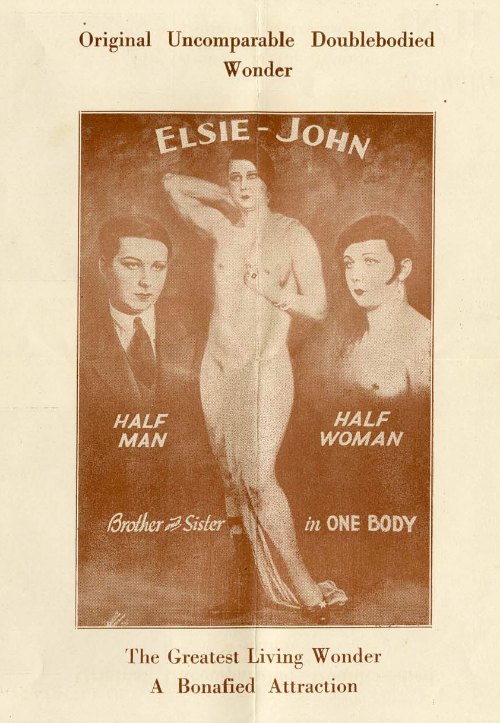The Sallie Bingham Center for Women’s History and Culture recently acquired a rare ephemeral promotional pamphlet, possibly published in Chicago in the 1930’s, European Enigma, International Sensation: Elsie-John, Half Man, Half Woman: Brother and Sister in One Body: Widely Imitated, Never Successfully Duplicated. The pamphlet promotes a German-born “hermaphrodite” performer, also known as a “half-and-half” in the parlance of the side show or “freak” show trade because of the custom of presenting one of half of the body with attributes of a typical male and the other half female.
Beginning as a popular pastime in seventeenth-century Europe, freak shows featured performances intended to shock viewers such as exhibitions of biological rarities or heavily tattooed or pierced people, as well as extreme activities like fire-eating and sword-swallowing. Performers could be physically unusual humans such as those uncommonly large or small, those with both male and female secondary sexual characteristics, and people with other extraordinary diseases and conditions. As attitudes changed about physical differences and previously mysterious anomalies were scientifically explained, laws were passed restricting the freak show resulting in a decline in this form of entertainment.
The pamphlet includes six halftone views of Elsie-John as a man and as a woman as well as an autobiographical sketch. Elsie John, a performer in Chicago in the 1930s and 1940s, was connected to the Beat Generation of writers. The poet Herbert Huncke (1915-1996), who appears as a thinly-veiled character in both William S. Burroughs’ 1953 novel Junkie and Jack Kerouac’s On the Road, and was by some accounts the source of the term “Beat,” wrote that he had been taken at an early age under the wing of Elsie John, who appears to have introduced Huncke both to heroin and to the gay underground of 1930s Chicago. Huncke’s short memoir “Elsie John” is an unsentimental but affectionate sketch of the performer.
Post contributed by Laura Micham, Merle Hoffman Director, Sallie Bingham Center for Women’s History and Culture and Curator, Gender and Sexuality History Collections.



